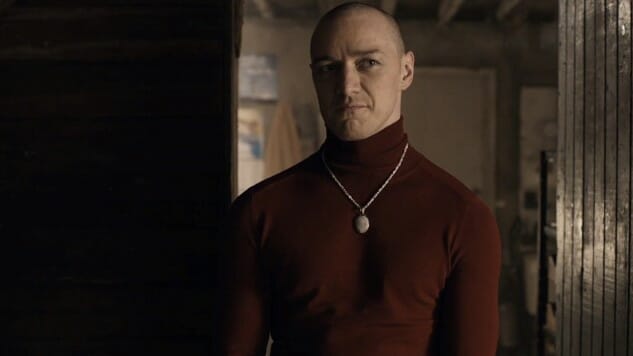Split

Split is the film adaptation of M. Night Shyamalan’s misunderstanding of 30-year-old, since-discredited psychology textbooks on Dissociative Identity Disorder, but if we deign to treat it with scientific scrutiny, we’ll be here all night. Suffice it to say, don’t go looking at anything in this film as psychologically valid in any way. But do go see Split, because it’s probably M. Night Shyamalan’s best film since Signs. Or maybe since Unbreakable, for that matter.
If you were unaware that Split was written and directed by M. Night Shyamalan, you could be forgiven for that bit of ignorance. Studios distributing his films still have a strange relationship with Shyamalan’s name, even after the commercial and critical success of 2015’s The Visit. They can’t seem to decide whether prominently seeing the name “Shyamalan” in a trailer or TV spot is a boon or a pitfall, whether it’s something that will inflate weekend grosses thanks to whatever Sixth Sense fondness still remains in the moviegoing public or drive them down through association with the likes of The Happening or The Last Airbender. The man is a contentious figure in America, and he’s responsible for the only time I’ve ever heard an entire audience laugh out loud when a director’s name flashed on screen during a film trailer.
I’ve been fascinated by Shyamalan’s fall from grace after he was proclaimed at a young age as the “next Hitchcock.” I gave The Visit a cautiously positive score, finding it entertaining but deceptively marketed by the studio as a true horror film when it’s actually much more of a horror comedy. I even ranked every film in Shyamalan’s career, which I’ll be updating immediately with Split. Because if The Visit hinted that there was more still left in the director’s tank, Split is the true “return to form” for which his fans have secretly been holding out since the early 2000s.
The story is refreshingly conventional in structure: A man suffering from lifelong dissociative identity disorder (James McAvoy) kidnaps a group of three girls, including Casey, played by Anya Taylor-Joy, still fresh off her head-turning performance in our #1 horror movie of 2016, The Witch. As they languish in captivity and begin to understand the quirks of the man who has imprisoned them, they must use what they can learn about his various personalities to escape before the arrival of a mysterious 24th (and final) personality, “The Beast.” Supporting is an elderly therapist (Betty Buckley) who has championed the cause of DID sufferers in the medical community, and treated McAvoy’s character for years.
One must first talk about McAvoy, an actor for whom Shyamalan must have been ecstatic to write a huge leading part. He is tremendous in Split, playing the type of role for which you unfortunately can’t win a major award—unless the film is a drama, of course. His subtle changes in body language, posture and facial expressions effortlessly convey whichever personality is “in the light” at any given moment. Unfortunately for those wanting to see some truly zany acting, the “23 personalities” aspect is more of a tease than anything else. The true context of the film revolves around four or five of those personalities coming into conflict with one another, while the others simply make very brief or nonexistent cameos.
-

-

-

-

-

-

-

-

-

-

-

-

-

-

-

-

-

-

-

-

-

-

-

-

-

-

-

-

-

-

-

-

-

-

-

-

-

-

-

-








































